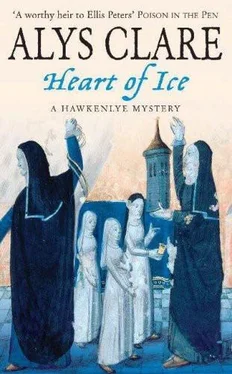Alys Clare - Heart of Ice
Здесь есть возможность читать онлайн «Alys Clare - Heart of Ice» весь текст электронной книги совершенно бесплатно (целиком полную версию без сокращений). В некоторых случаях можно слушать аудио, скачать через торрент в формате fb2 и присутствует краткое содержание. Год выпуска: 2007, Издательство: Hachette Littlehampton, Жанр: Исторический детектив, на английском языке. Описание произведения, (предисловие) а так же отзывы посетителей доступны на портале библиотеки ЛибКат.
- Название:Heart of Ice
- Автор:
- Издательство:Hachette Littlehampton
- Жанр:
- Год:2007
- ISBN:нет данных
- Рейтинг книги:4 / 5. Голосов: 1
-
Избранное:Добавить в избранное
- Отзывы:
-
Ваша оценка:
- 80
- 1
- 2
- 3
- 4
- 5
Heart of Ice: краткое содержание, описание и аннотация
Предлагаем к чтению аннотацию, описание, краткое содержание или предисловие (зависит от того, что написал сам автор книги «Heart of Ice»). Если вы не нашли необходимую информацию о книге — напишите в комментариях, мы постараемся отыскать её.
Heart of Ice — читать онлайн бесплатно полную книгу (весь текст) целиком
Ниже представлен текст книги, разбитый по страницам. Система сохранения места последней прочитанной страницы, позволяет с удобством читать онлайн бесплатно книгу «Heart of Ice», без необходимости каждый раз заново искать на чём Вы остановились. Поставьте закладку, и сможете в любой момент перейти на страницу, на которой закончили чтение.
Интервал:
Закладка:
He rolled over on to his back, pushing back the blanket and feeling the relief of the cold night air on his face and his neck.
He realised that his head was aching.
Chapter 16
At Hawkenlye, it was becoming increasingly difficult for even the most optimistic souls to believe that the outbreak was under control. Twenty-three people lay sick and, in some cases, dying in the infirmary in the Vale. Sister Beata had been joined in death by a young monk called Roger and a little novice nun whom nobody knew very well because she always kept her head down and never spoke unless she really had to. Sister Judith was still very ill. Brother Firmin, who had serenely given himself up to death, appeared to be a little better.
Sister Euphemia, despite the best efforts of her senior nurses, continued to bear on her broad shoulders the full responsibility for the sick. This was due neither to vanity nor an overwhelming sense of her own importance; it was simply that she appeared to have a God-given gift for healing and she refused to set it aside. It was as if, when face to face with someone who had decided that death was just around the corner, the infirmarer possessed a penetrating voice that, even if it did not always call the dying one back, at least gave the patient the opportunity to see if there was an alternative. Sister Euphemia possessed hands which, once laid upon the forehead of a feverish man or woman, instilled relief and a new confidence; more than one recovering patient was heard to observe that it was the big sister in charge who’d made them better; ‘She told me I weren’t so sick as I’d feared,’ one woman said, ‘and, once she’d got a few mugs o’ that cold water into me, reckon I started to believe her.’
Sister Caliste could see that the infirmarer was on her knees with exhaustion. She pleaded with her superior to rest, to retire to her bed and catch up on her sleep, but Sister Euphemia insisted that the occasional short spell napping on a screened-off cot at the far end of the temporary infirmary was all that she needed. Such spells were, however, not very restful at all since, as Sister Caliste well knew, the infirmarer’s acute ears picked up even the faintest sounds of distress, at which she would be up and out of the little recess the moment she had straightened her veil. And sounds of distress were all too common in that place of suffering.
Finally Sister Caliste, hating herself for the disloyalty, went to the Abbess. Entering in response to the Abbess’s quiet ‘Come in’, and bowing low, she said, even before she had straightened up, ‘My lady Abbess, I am sorry to disturb you but I must report that Sister Euphemia urgently needs a respite from her labours and-’ She stopped herself before she could add ‘and flatly refuses to take it.’
But the Abbess knew her infirmarer of old. As Sister Caliste straightened up, she found the calm grey eyes watching her. ‘And I imagine,’ the Abbess said, ‘that, despite the repeated pleas of all her nursing nuns, she will not rest?’
‘No,’ agreed Sister Caliste.
The Abbess was silent for some moments. Then she said, ‘Sister, assess for me, if you would, the strength of the nursing staff.’
Sister Caliste paused, ordering her thoughts. Then she said, ‘Sister Tiphaine is the most respected, after Sister Euphemia. Although her skill is primarily in the preparation of herbal remedies, she has a wealth of experience and people believe in her. We’ve lost Sister Beata, of course, and she is sorely missed, and Sister Judith is still sick. Sister Clare has joined us, and Sister Anne, as well as Sister Emanuel, whose particular touch with the elderly is most useful. Then we have a number of other sisters, as well as two monks, who tend the patients when their other duties allow.’
The Abbess was still regarding her. ‘You have left someone out,’ she observed.
Sister Caliste frowned. ‘Have I, my lady? I am sorry, I-’ But then, blushing, she realised what the Abbess meant.
‘Sister, I have in mind to organise three teams of nurses,’ the Abbess said after a moment. ‘If you are willing, I propose that you lead one, and that Sister Tiphaine and Sister Emanuel lead the others. Each of you will select a senior nursing nun as your second in command, and Sister Euphemia will be in overall control. I will ask for volunteers and, provided our nuns and monks respond as I hope and pray they will, we will aim at teams of perhaps as many as six. I am right in saying, am I not, that the nursing duties required amount more to sheer hard work than to any particular skill?’
‘You are, my lady,’ Sister Caliste agreed, ‘for indeed it is in the main a matter of making the patients drink, of getting them to take their draughts of the remedies and of bathing them when they are feverish, washing the sheets and cleaning them up when they’ve — er — of cleaning them.’
‘Quite so,’ murmured the Abbess. ‘What do you think, then, Sister? Would this plan persuade Sister Euphemia that it was permissible for her to take a day off and sleep?’
Sister Caliste smiled. ‘I believe it might, my lady, were it you who proposed it.’
The Abbess answered her smile. Rising to her feet, she said, ‘Then let us waste no more time.’
Sister Caliste waited outside the Vale infirmary while the Abbess went in and summoned Sister Euphemia. The two senior nuns soon emerged and walked a short way off down the path that led to the lake. The two veiled heads were close together; the Abbess and the infirmarer were obviously deep in conversation. Sister Caliste took the opportunity to slide down onto a bench beside the infirmary door and close her eyes for a precious few moments. .
‘There is no need to repeat yourself,’ Helewise said, restraining her impatience with difficulty, ‘I heard you the first three times, Euphemia.’ The infirmarer made to speak but Helewise held up her hand. ‘If you continue to work all day and all night, soon you will be exhausted, nature will take over and you will collapse, whether you wish it or not. Then where should the rest of us be? We can work according to your instructions, my very dear Sister, but if you have driven yourself to unconsciousness, where will you be when we need your advice?’
‘I-’ the infirmarer began.
‘This is an order, Sister,’ Helewise said gently. ‘Out of my great respect for you and bearing in mind our long friendship, I am reluctant to remind you of our relative positions here. But, nevertheless, in this case I am so doing.’
Sister Euphemia stared at her. The infirmarer’s eyes were ringed with dark circles, the eyelids swollen from fatigue. ‘What must I do?’ she asked.
Helewise’s heart almost failed her. But, summoning her resolve, she said firmly, ‘You are to go to bed and you are to stay there until tomorrow morning. In the dormitory, mind; I don’t mean that cot of yours at the end of the Vale infirmary.’
‘But it’s the middle of the morning!’ Sister Euphemia protested. ‘Nuns don’t go to bed in the middle of the day!’
‘They do if they are worn out from hard work and their Abbess demands it,’ Helewise replied coolly. ‘Now, go to the refectory, tell Sister Basilia that I have ordered that you be given whatever you wish to eat and drink, then go and sleep.’
All at once Sister Euphemia’s resistance fell away. It was the word sleep , Helewise decided, watching her with compassion; hearing it, the infirmarer’s eyes had all but closed and she swayed on her feet.
‘Go on,’ Helewise urged.
Sister Euphemia made one last effort. ‘You are quite sure that these rotas of yours will work properly?’
‘Oh, yes,’ said Helewise serenely.
‘Hm.’ The infirmarer took a step up the path towards the Abbey. Then another.
Читать дальшеИнтервал:
Закладка:
Похожие книги на «Heart of Ice»
Представляем Вашему вниманию похожие книги на «Heart of Ice» списком для выбора. Мы отобрали схожую по названию и смыслу литературу в надежде предоставить читателям больше вариантов отыскать новые, интересные, ещё непрочитанные произведения.
Обсуждение, отзывы о книге «Heart of Ice» и просто собственные мнения читателей. Оставьте ваши комментарии, напишите, что Вы думаете о произведении, его смысле или главных героях. Укажите что конкретно понравилось, а что нет, и почему Вы так считаете.












